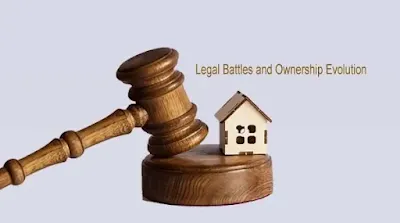Legal Battles and Ownership Evolution
Introduction:
Ownership Evolution, a concept deeply ingrained in human society, carries multifaceted implications, ranging from personal belongings to legal rights. The narrative unfolds with a peculiar incident involving a purchased Barbie doll. It takes us on a journey questioning the fundamental idea of ownership.
Ownership Evolution: and Historical Perspectives
The Auction of Barbies:
In 2007, Shinan Wassanat attended an auction where a storage company was liquidating items left by tenants who had failed to pay their rent. Among the things, Shinan purchased a Barbie doll for a mere two dollars. Little did she know that hidden within this innocent doll was a mysterious and unsettling secret.
Unveiling the Enigma:
Upon opening the doll at home, Shinan discovered a severed human foot inside. Disturbed and bewildered, she immediately contacted the police, leading to a thorough investigation. The ownership of the severed foot became a focal point, challenging our conventional understanding of possession.
The Intriguing Identity:
Further investigation revealed that the foot belonged to a man named Jan Wad, who had previously suffered a tragic incident resulting in severe injuries and the loss of his father. Struggling with financial hardships, Jan found himself homeless and opted to store his belongings in a rented storage unit.
Legal Battle Unfolds:
Philosophical Reflections:
This bizarre incident prompts profound reflections on the nature of ownership. The story challenges common assumptions about bodily autonomy, the sanctity of personal belongings, and the legalities surrounding possession. It raises questions about the definition of ownership in a world where the boundaries of possession are constantly blurred.
Ownership Evolution
Legal Developments and the Journey of Fraud
The laws related to property ownership can be traced back as far as four thousand years ago. In every new legal book, there is a question, "What is property?" However, a clear answer is not found because its meaning keeps evolving. In 1698, John Locke defined it as, "We ourselves are the owners of what we have built, shaped, and created with our labor. Purchasing something makes it our property because its creation was achieved through our hard work." But more than this simple definition is required. There is a common agreement on the concept of property regarding the shared understanding of buying and selling property.
The Lenape tribe in the Second Nova community believes that your ownership is only what you can carry. In some North American tribes, ownership is perceived as one's own spirit. The famous purchase of Manhattan by Peter Minuit in 1626 during the Dutch West India Company's Waldensian campaign is a fascinating example. The only record of this deal was a letter from the Dutch West India Company stating, "Manhattan Island has been purchased from the Indians for sixty guilders." At that time, this land was rich in agricultural resources and had abundant water, making it suitable for colonization. However, a problem arose: Minuit's concept of buying was different from Lenape's concept of selling. Both parties had different ideas about what was agreed upon. The Second Nova tribe spoke the Pekan language, and their historians familiar with this language say that the word "property" did not exist in it. Ownership of natural objects did not happen. Air, water, and land could not be bought and sold. After trade became prevalent, the tribe refused to leave the land, and the buyers thought they were being deceived. When they were told to leave, the buyers thought an unlawful demand was being made. This difference was the concept of ownership.
What can be bought and sold? There are different laws for this everywhere. Is it legal to buy and sell a cat or a parrot? Generally, yes. A panda or a kangaroo? It depends on where you are. Drugs, a prescription for your medication? In many places, it is illegal. And these laws change over time. It wasn't long ago when humans were bought and sold in many places worldwide, just like any other commodity and species. Wars were fought not only to claim territory but also to obtain human property for labor and trade. The world owes many splendid things to the toil of a hundred thousand external enslaved people over thirty years. Property in enslaved people was related to the concept of ownership in many ways.
Ownership of land, property, and resources had its challenges. Not only did it pose ethical issues, but it also had logical problems. To avoid these problems, the law suggested that enslaved people did not have free will and could not reason. In the 19th century, a famous case occurred in Florida. An enslaved person named Luk struck down the horses, entering his owner's farm. The enslaved person was sentenced, but on appeal, the court reversed the decision, declaring Luk innocent and instead punishing his owner. This was the prevailing legal concept that because Luk was punished, he had free will. Enslaved people were expected not to possess the ability to make just decisions or show rational thinking. The accepted idea was that enslaved people did not have free will. To punish Luk meant acknowledging that he had free choice. This concept was the norm in slavery.
Today, slavery is considered illegal in every country, but there was a time when it was prevalent worldwide. People were accustomed to establishing ownership and engaging in the buying and selling of humans. However, human thought is not static, so ideas about rights keep changing. With time, people's ownership of property became unacceptable in certain places.
Must read
- How to Take Advantage of Falling Property Values
- Learn to Earn for Real Estate Success
- The Most Dangerous Mistakes in the Real Estate Business
- how to check property is legal or not
- how to start a rental property business
- Profits and Losses in Real Estate
- how to find best real estate agent
- Pros and Cons of Renting versus Owning Real Estate
- Strategies for Success in Real Estate 2024

